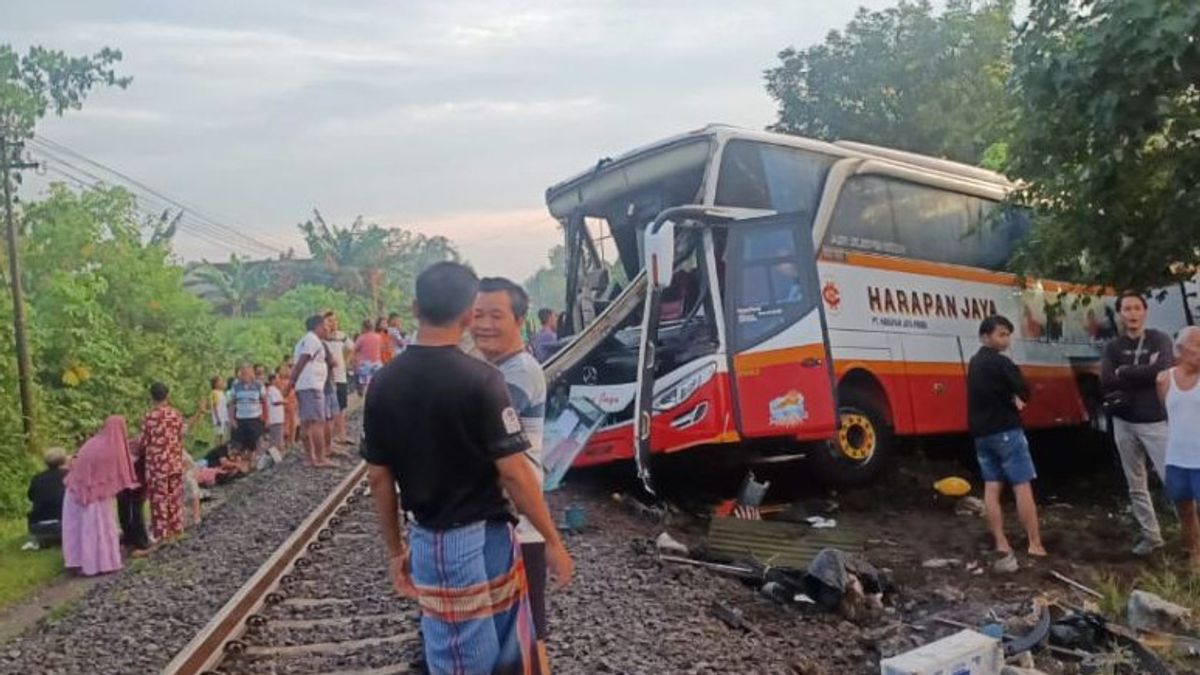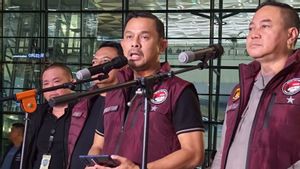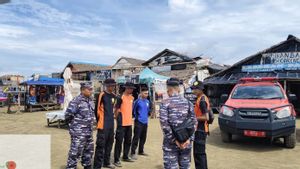JAKARTA - PT Kereta Api Indonesia (Persero) or KAI will soon close the level crossing in Tulungagung following a bus accident. This is in order to improve the safety of train travel.
KAI's VP of Public Relations Joni Martinus said KAI regrets that there was a traffic accident between the Bus and the Dhoho Train (Blitar-Kertosono) which occurred at the unguarded crossing between Tulungagung and Ngujang Stations this morning.
"KAI also expresses its condolences for the casualties and injuries suffered by the bus passengers due to the negligence of the bus driver," said Joni, in Jakarta, Sunday, February 27.
In addition, Joni said that as a result of the accident, there was damage to rail facilities in the form of passenger trains, locomotives, and delays in train travel.
"KAI will sue bus operators due to losses suffered by KAI," he explained.
Joni said KAI would immediately close the level crossing, in order to improve the safety of train travel.
"According to the Minister of Transportation Regulation No. 94 of 2018 Article 3, that KAI has the right to close unregistered, unguarded, and/or undoored level crossings that are less than 2 m (two meters) wide," he said.
Joni explained that all road users must prioritize train travel when crossing level crossings. This is in accordance with Law Number 23 of 2007 concerning Railways and Law 22 of 2009 concerning Road Traffic and Transportation.
In Law Number 23 of 2007 concerning Railways, Article 124 states that, at the intersection of a plot between a railway line and a road, road users are obliged to prioritize rail travel.
Then in Law Number 22 of 2009 concerning Road Traffic and Transportation, Article 114 states that, at level crossings between railway lines and roads, vehicle drivers are obliged to: stop when the signal has sounded, the rail gate has begun to be closed and or there is a another signal, giving priority to the train, and giving the first right to the vehicle that crossed the rail first.
"The low discipline of road users has resulted in the high number of accidents at level crossings between road and train users," he said.
In 2021, said Joni, there were 271 traffic accidents at railroad crossings with 67 deaths and 92 injuries.
Therefore, KAI also asks the government to improve travel safety at level crossings according to its authority. In accordance with Law Number 23 of 2007 concerning Railways, Article 94 paragraph 2 that the closure of level crossings as referred to in paragraph (1) is carried out by the Government or Regional Government.
Then, according to the Regulation of the Minister of Transportation Number 94 of 2018 Article 2, the party responsible for the management of roads that intersect with railroads is the owner of the road. The details are the minister, for national roads, governors, for provincial roads, regents/mayors, for roads regency/city and village roads, and legal entities or institutions, for special roads used by legal entities or institutions.
"KAI hopes that all parties can be proactive and jointly carry out tasks according to their respective authorities to improve the safety of train travel and road users themselves," said Joni.
In 2021 alone, KAI has closed 311 illegal plot crossings in order to normalize the railway line. Currently, there are 3,105 level crossings between railway lines and roads, of which 54 percent or 1,696 are illegal or unguarded crossings.
KAI also continues to socialize traffic safety at level crossings where in 2021 there have been 77 socializations in various regions with stakeholders.
"KAI hopes that traffic accidents at level crossings will continue to be suppressed through the role of each party in accordance with their authority and increasing the discipline of road users during traffic," concluded Joni.
The English, Chinese, Japanese, Arabic, and French versions are automatically generated by the AI. So there may still be inaccuracies in translating, please always see Indonesian as our main language. (system supported by DigitalSiber.id)













